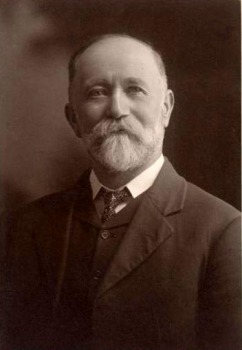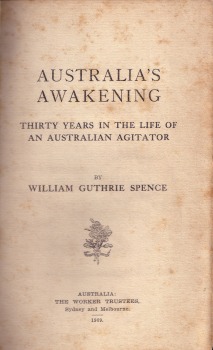“True patriotism should be racial.” ~ W. G. Spence
[William Guthrie Spence (1846-1926) was one of Australia’s foremost trade union leaders. Reproduced here are various extracts from his book of reminiscences, Australia’s Awakening: Thirty Years in the Life of an Australian Agitator (1909).]
 Chapter XIII. The Industrial Fight in Queensland.
Chapter XIII. The Industrial Fight in Queensland.
The squatters had cut wages. This was bad enough, but when they were going to fill white men’s places with Chinese, and further insisted on “freedom of contract,” shearers and shed hands had no alternative but to go on strike. Even Sir S. Griffith admitted to a deputation that the request of the Union for open conference was reasonable. He did nothing to help, however; but on the contrary put his great ability at the disposal of the employers. He was one of the Cabinet at the time. Every effort at conciliation was made by the workers without avail. It has become clear since that the ruling authorities had never intended to give fair play. They laid their plans to crush the men, and it stands to the credit of the workers that in spite of all the powers of State, of suffering and imprisonment, they stood true to the cause they fought for, and proved themselves worthy sons of the great white race. [ch. 13, p. 145]
Chapter XVIII. Political Action.
The practical independence of government granted under the Australian Constitution, with the manifest advantages of being part of a big Empire and under its protection if need arose, together with the growth of the national spirit of a “White Australia” and the broad humanitarianism taught by the Labor Party, have developed a feeling of loyalty to race rather than to governments, but have abolished any talk of either republicanism or of independence. The desire for the unity of the white race is strong. The recent visit of the “Great White Fleet” of the American navy emphasised the feeling of warm friendship previously existent, and the very general desire that unity should be definitely established between all self-governing parts of the British Empire and the American nation. The striking unity of the Labor Party nationally, and the breadth of its teaching and aims, have made its influence felt in Australian thought, and have developed a higher and more intelligent loyalty than previously existed. [ch. 18, p. 229]
Chapter XX. Queensland.
A colored census taken in 1898 showed that there were 24,366 colored aliens in Queensland — one for every five adult white males. Chinese predominated. [ch. 20, p. 273]
The stand made by the shearers and shed employees in 1891 was not only against a reduction of wages and an attempt to introduce “freedom of contract,” but was principally against the introduction of Chinese labor. [ch. 20, p. 274]
 Chapter XXV. Labor in the Commonwealth.
Chapter XXV. Labor in the Commonwealth.
Australians generally rejoice in the steady growth of the new nation in the Southern Seas. As a matter of fact, there is a strong desire for unification and abolition of the six State Parliaments. This feeling is quite a spontaneous one, and has not been fostered by politicians. It is almost certain that, as time goes on, extended powers and functions will be vested in the Commonwealth Parliament, and those of the States decreased. The work done by the Commonwealth Parliament has popularised that body. This is easily understood when we remember that both Houses are elected by full adult suffrage. It cannot be denied that the influence of the Labor Party has forced humanitarian questions to the front, and such legislation appeals to the masses. The demand for a “White Australia,” set forth in the Labor Party’s platform and also supported by members of other parties, could only be met by legislation from a Federal authority. The abolition of the kanaka contract labor in the sugar industry of Queensland was another kindred matter which was early dealt with. The exclusion of alien and colored races gives a chance for the development on the Australian Island continent of a great nation of the white race, and that ideal has come to stay and dominates Australian sentiment very largely. [ch. 25, p. 376-377]
The policy of a “White Australia” was given effect to by the passing of the Immigration Restriction Act. The bill passed the second reading on August 2, 1901. Out of consideration for English fears and prejudices the Government provided for keeping out undesirable aliens by an education test. If the person desirous of entering Australia is considered undesirable the department finds out some language which it knows he does not understand, and then dictates fifty words to him. Of course he fails, and is then deported back to where he came from. This is a round-about and mean sort of way to accomplish the end sought, and Labor believed in saying straight out that we did not want any other than the white race here. On reaching the clause on September 25, Mr. Watson moved to insert — “Any person who is an aboriginal native of Asia, Africa, or of the Islands thereof.” On division this was lost by 31 to 36, only one Government supporter (Mr. Higgins) voting with the party. Mr. Watson, in another clause, secured the exclusion of manual laborers under contract. The measure as finally passed can only be made effective by careful and active administration, and depends too much on Customs officials, who may not in all cases be in sympathy with the spirit of the Act itself. The kindred measure — the Pacific Island Laborers’ Act — was passed, in which provision was made for deporting back to their old homes all kanakas who had been brought to Queensland. The work was to be done gradually, but has long since been completed. Associated with this measure was the adoption of a Sugar Bounty Act, under which a liberal bounty was paid to growers of sugar cane or sugar beet if produced by white labor, with an excise charged those who employed black labor. This has proved a great success. There has been not only the removal of the colored employees, and consequent increase of employment for white men, but the industry has grown to such an extent that the supply of Australian-grown sugar is sufficient for the requirements of the people of the Commonwealth. [ch. 25, p. 381-382]
The second Parliament opened on March 2, 1904. There were still three parties, and the relationship between Labor and the Government continued to be cordial and friendly. On March 17 Mr. Watson raised a rather important principle when he moved — “That the House records its grave objection to the entry of Chinese labor into the Transvaal until a referendum of the white population of the colony has been taken on the subject or responsible Government is granted.” Objection was taken that this was an interference with matters outside our jurisdiction, and that we had nothing to do with what the Home Government had control of. The majority of the House claimed, however, that as a part of the British Empire we had a right to express an opinion upon any act calculated to injure our own kindred. An amendment was rejected by 45 to 13, and the motion was carried by 54 to 5. [ch. 25, p. 384]
Chapter XXVII. Eighteen Years of Social Evolution.
Whilst it is admitted that the Labor Party was not alone in its advocacy of a White Australia, there is one phase of that question in which it specially led the way. A few years ago it was a common cry that the tropical portion of Australia was not a white man’s country. It was held that women and children could not live in North Queensland, for instance, or in the Northern Territory. Outside of the ranks of the Labor Party this idea was generally accepted. It was asserted that sugar could not be grown if the growers had to depend upon white labor. It was not merely a question of wages; it was claimed that he could not stand the work in that climate. Labor was the only political party in the States which held an opposite view. Federally, it had the help of the Barton-Deakin party, but time has proved that the Labor Party’s foresight and knowledge were correct. Sugar is successfully produced by white labor, and the figures of Mr. Knibbs, the Commonwealth Statistician, prove Queensland to be the healthiest place in the world for women and children, as the increase of population by excess of births over deaths is 1720 per 100,000, whereas the average for the Commonwealth is 1694.
The Anti-Socialist is invariably the most unpatriotic person to be found. He belongs to the “stinking fish” party. If he cannot get his own stupid way he denounces the country in which he has done so well. The bedrock of the cry for a color line across the continent, so that Anti-Socialists could boss niggers and yellow men, is found in the Anti-Socialist’s nature. He is a born tyrant, and as the white Australian will not stand his tyranny he must have a nigger to order about. There is no patriotism in the Anti-Socialist press, hence it barracks for anything the capitalist crowd asks for.
Whilst giving due credit to many public men of other political parties who individually spoke up for a White Australia, I have no hesitation in asserting that but for Labor there would have been a compromise, and Australia would not have been a white man’s country to-day. [ch. 27, p. 436-437]
Chapter XXXVI. Labor’s Objective.
The Labor Movement in Australia is a political as well as a propagandist movement. Its leaders realise that before we can have social reform the people must be educated to demand and carry out such reforms. The platforms, Federal and State, indicate the practical proposals for which public opinion is considered ripe. The objective and the general platform give an idea of the propagandist side. The first part of the Federal objective declares for “The cultivation of an Australian sentiment based upon the maintenance of racial purity and the development in Australia of an enlightened and self-reliant community.” The party stands for racial purity and racial efficiency—industrially, mentally, morally, and intellectually. It asks the people to set up a high ideal of national character, and hence it stands strongly against any admixture with the white race. True patriotism should be racial. [ch. 36, p. 587]
References:
William Guthrie Spence, Australia’s Awakening: Thirty Years in the Life of an Australian Agitator, Sydney: The Worker Trustees, 1909
Australia’s Awakening, Australian Digital Collections, The University of Sydney

Speak Your Mind